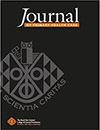HC24136 Full Text | HC24136PDF (670 KB) Open Access Article

Journal of Primary Health Care
Volume 16 Number 3 2024
HC24133 Full Text | HC24133PDF (633 KB) Open Access Article
HC24130 Full Text | HC24130PDF (634 KB) Open Access Article
HC23102Who uses yoga and why? Who teaches yoga? Insights from a national survey in New Zealand
What is already known: While there is extensive global documentation on the sociodemographic attributes of yoga instructors and users, along with their motivations for engaging in yoga, the specifics of yoga instructors and users in New Zealand remain relatively unexplored. What this study adds: This study aims to fill this gap by investigating the distinctive traits and backgrounds of yoga instructors and users in New Zealand. Additionally, the study examines the rationale behind yoga use, the factors that shape participant involvement, participantr methods of seeking information, and how participants communicate with healthcare providers. The insights garnered from this research aim to provide valuable information to the healthcare sector in New Zealand.
HC23102 Abstract | HC23102 Full Text | HC23102PDF (1.9 MB) Open Access Article
What’s already known: Sexual orientation and gender identity (SOGI) minority populations face known and preventable health inequities. However, SOGI data are not collected in routine data collection such as administrative health data, and there are limited studies exploring whether these populations are comfortable with having their data stored in these datasets. What does this study add: The research offers estimates of comfort with having sexual identity data recorded in official datasets among the GBM population of NZ, contributing to a larger body of research that primarily focusses on disclosure in health care settings.
HC23107 Abstract | HC23107 Full Text | HC23107PDF (727 KB) Open Access Article
HC23123Worldviews of hearing health for Pacific peoples in Aotearoa New Zealand: a mixed methods study
What is already known: Limited international research with Pacific Island communities has examined ear disease and hearing health knowledge and beliefs to inform health service delivery. What this study adds: This study is the first mixed-methods investigation using a Pacific methodological approach to examine Pacific peoples’ ear and hearing health worldviews, including knowledge, beliefs, and experiences of the hearing healthcare system in Aotearoa New Zealand. It will assist healthcare professionals in providing more responsive ear and hearing care services for Pacific peoples.
HC23123 Abstract | HC23123 Full Text | HC23123PDF (729 KB) | HC23123Supplementary Material (585 KB) Open Access Article
HC23136Māori and Pacific young people’s perspectives on testing for sexually transmitted infections via an online service: a qualitative study
 , Tracey Gardiner, Abigail Dunlop, Marama Cole, Susan M. Garrett
, Tracey Gardiner, Abigail Dunlop, Marama Cole, Susan M. Garrett  and Eileen M. McKinlay
and Eileen M. McKinlay 
What is already known: Screening sexually active young people for asymptomatic chlamydia and gonorrhoea is important to detect infection, prevent transmission and reduce reproductive health risks. Free online postal self-sampling for sexually transmitted infection (STI) testing is an acceptable alternative to clinic-based testing in some countries, but accessibility and acceptability of online testing in Aotearoa New Zealand is unknown. What this study adds: Opinions about online STI testing among Māori and Pacific young people were mixed, but more concerns than potential advantages were identified. Equity in access to online STI testing by Māori and Pacific young people could be improved by reducing cost, improving awareness about STI testing, and addressing barriers identified in the online testing pathway.
HC23136 Abstract | HC23136 Full Text | HC23136PDF (802 KB) | HC23136Supplementary Material (993 KB) Open Access Article
HC23143Preferred format and strategies for seeking and trusting online health information: a survey of cardiology outpatient attendees across three New Zealand hospitals
 , Faith Mahony, Arier Lee, Andrew McLachlan, Jennie Dean, Jane Clarke, Siobhan Lehnhard, Robyn Whittaker, Matire Harwood, Jacqueline Cumming and Janine Bycroft
, Faith Mahony, Arier Lee, Andrew McLachlan, Jennie Dean, Jane Clarke, Siobhan Lehnhard, Robyn Whittaker, Matire Harwood, Jacqueline Cumming and Janine Bycroft
What is already known: The COVID-19 pandemic and its sequelae served to reduce access to health care providers, exacerbated unmet preventive and diagnostic health needs and made online health information even more important for consumers to make decisions about self- and family-care. What this study adds: This survey asked an ethnically diverse group of patients attending cardiology outpatients what format of information was most valued and strategies they use to trust the information they find. Simple fact sheets were the most preferred online format followed by videos and discussion groups with the best ‘life-hack’ being to get their health professional’s advice on the most trusted website for their condition.
HC23143 Abstract | HC23143 Full Text | HC23143PDF (750 KB) | HC23143Supplementary Material (212 KB) Open Access Article
What we already know: Rural hospitals provide access to secondary care for rural patients but little is known about their contribution to the health system or the community. What this study adds: Rural communities see a role for rural hospitals to enhance access to emergency care, provide family support and personalised care respectful of cultural preferences.
HC24058 Abstract | HC24058 Full Text | HC24058PDF (759 KB) Open Access Article
What is already known: Telephone and video consultations are widely used in general practice. Evaluating these virtual services from an ethical perspective is challenging yet essential to ensure good quality of care. What this study adds: We developed a practical ethical checklist for direct-to-consumer telemedicine services that should make ethical assessment more accessible for all stakeholders.
HC24027 Abstract | HC24027 Full Text | HC24027PDF (813 KB) | HC24027Supplementary Material (1 MB) Open Access Article
What is already known: We have developed a practical ethical checklist comprising 25 questions to assess direct-to-consumer virtual consultation services from an ethical perspective. What this study adds: This study applies the practical ethical checklist to six direct-to-consumer virtual consultation services in Aotearoa New Zealand. It identifies their strengths and weaknesses in this area and raises fundamental questions on what we deem important in virtual care.
HC24030 Abstract | HC24030 Full Text | HC24030PDF (703 KB) | HC24030Supplementary Material (544 KB) Open Access Article
What is already known: There is a shift towards general practitioners (GPs) prescribing gender-affirming hormone therapy (GAHT) in primary care settings using an informed consent model of care. There is a lack of long-term data on health and wellbeing outcomes for people taking GAHT in Aotearoa New Zealand. What this study adds: The insights from this study offer a blueprint for current and future survey design, to ensure data collection is responsive to the needs of transgender and non-binary (TNB) communities and health care providers. These findings will inform future research to equip health care professionals involved in prescribing GAHT with local, evidence-based data to support their delivery of quality health care to TNB people.
HC23170 Abstract | HC23170 Full Text | HC23170PDF (710 KB) | HC23170Supplementary Material (501 KB) Open Access Article
HC23131A supported primary health pathway for mild traumatic brain injury quality improvement report
What is already known: Some patients with mild traumatic brain injury (mTBI) can experience persistent symptoms for many years if not treated early. Early access to specialist services such as concussion services can significantly improve patient recovery. What this study adds: This study provides initial evidence that a supported health care pathway following mTBI is feasible to implement in primary care and can facilitate early access to concussion services for those who need it.
HC23131 Abstract | HC23131 Full Text | HC23131PDF (965 KB) | HC23131Supplementary Material (285 KB) Open Access Article
HC24092 Full Text | HC24092PDF (635 KB) Open Access Article
HC24135 Full Text | HC24135PDF (627 KB) Open Access Article
HC24131 Full Text | HC24131PDF (713 KB) Open Access Article



